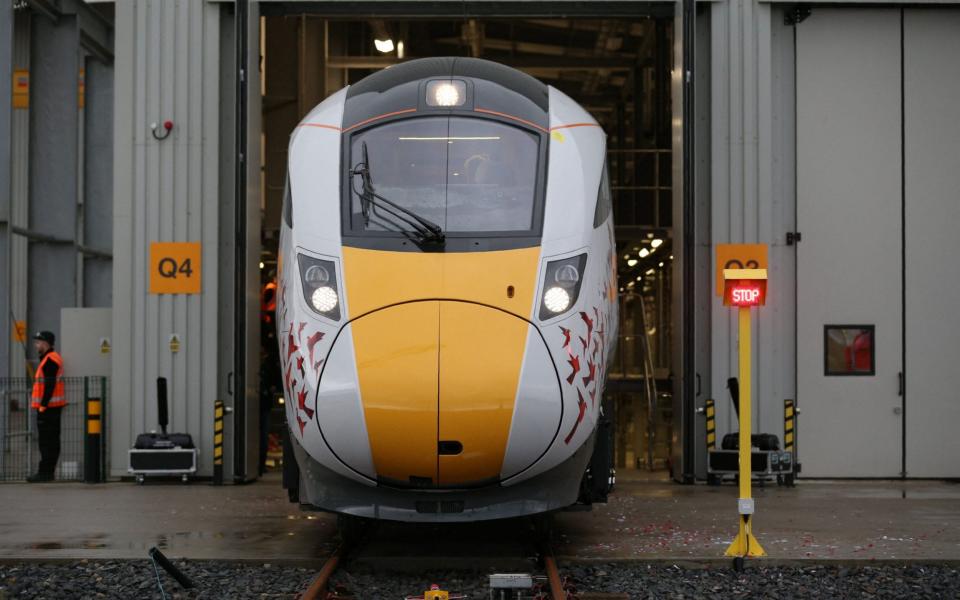Hitachi told to pay compensation bill for rail chaos

Ministers are demanding that Hitachi picks up the multi million-pound bill for passenger compensation after some of Britain’s busiest rail lines were hit by mass cancellations due to faulty trains.
Passengers endured a third day of significant disruption on intercity services to the north and west as investigators continued their probe into the threat of faults on Hitachi trains. Two InterCity 225 trains built in the early 1990s will be brought back into service later this week by LNER, the state-owned east coast main line, in response to the problems.
The Government said the Agility consortium that owns the trains and is led by Hitachi must “fully compensate the taxpayer”.
Thousands of passengers are in line to claim refunds. Telegraph analysis of pre-pandemic revenues indicates the daily cost is between £1m and £2m.
The cancellation of rail franchising last September by Grant Shapps, Transport Secretary, means taxpayers - rather than operators - would typically be on the hook to refund customers.
However, a spokesman for the Department for Transport said: “We expect those who have the contractual performance and train availability obligations, including Agility Trains, to fully compensate the taxpayer. We are currently assessing options to ensure taxpayers do not bear the burden."
Whitehall officials and industry leaders are reviewing options to find replacement trains in case the fault cannot be fixed quickly.
Prior to the pandemic annual revenues at Great Western Railway and LNER were £1.4bn and £782m respectively - equivalent to a combined £6m a day.
With passenger volumes running at roughly 30pc of pre-crisis levels, this means as much as £2m each day may need to be refunded. Given that the revenues include some non-intercity services, the figure is likely to be lower, but could still be in excess of £1m.

Taxpayers are not on the hook for the cost of leasing the stricken trains, however. Contractual terms mean that operators do not have to pay for the trains when they are not in service, leaving Hitachi facing mounting losses.
The Japanese firm owns a 70pc stake in a consortium that leases the trains to operators. Annual revenues from leasing the trains to the operators, which pass the costs onto the Government, are almost £700m each year.
The crisis represents a narrow escape for listed infrastructure investor John Laing, which sold its 30pc stake to AIP for £421m just eight months ago. John Laing last week confirmed it was in takeover talks with Wall Street buyout giant KKR in a deal worth almost £2bn.
GWR and LNER said that passengers claiming refunds for future bookings would not have to pay a £10 admin charge.
LNER warned its passengers that the cancellations and delays are set to last for a “number of weeks”. The line announced 22 cancellations of services to and from Kings Cross and said a temporary timetable would remain in force until the end of the week.
GWR announced it had no or very limited services running from Paddington to Bristol, Cardiff, Plymouth, Hereford and Cheltenham.
More than 150 Class 800 trains were taken off the tracks over the weekend after cracks were identified late on Friday night. Preliminary safety tests on Saturday morning identified that the problems were more widespread than initially thought.
The cracks found in the undercarriage of the trains are in aluminum blocks used by engineers to lift them off the ground during maintenance.
An informal group of representatives from the Department for Transport, Hitachi, the train operators, and regulator the Office of Rail and Road was convened over the weekend.

GWR, operated by FTSE 250 firm FirstGroup that which provides fast services to the west of England and Wales, has been hit hardest by the faults.
The GWR trains have suffered a number of problems since being brought into service in 2017. They were taken out of service days after their launch following engine faults and problems with leaking air-conditioning.
Last month a separate probe was launched after fatigue cracks were found in the undercarriage of the trains. The investigation is ongoing, Hitachi said.
A Hitachi Rail spokesman said: "An inspection has identified cracks on the lifting points under the carriage of some Class 800 trains. Safety is our number one priority and as a precaution this continues to impact the number of trains that can run in service.
"We acknowledge the Government’s clear direction regarding the forward repair plan, and our teams continue to work day and night with the ORR, operators and independent experts. We thank passengers for their ongoing patience."
Robert Nisbet, of Rail Delivery Group, said: “We are sorry for any disruption experienced by passengers as a result of the necessary withdrawal of Hitachi trains on some routes. We understand that any disruption is frustrating, however our passengers’ safety must always be our first priority.
“Rail companies are working closely together to minimise any impact of the Hitachi recall wherever possible, including loaning alternative trains across the network, installing shuttle services and offering cross ticket acceptance for alternative routes.
“We also continue to work closely with Hitachi to finalise a plan to bring as many trains back into service as quickly as it is safe to do so. In the meantime, passengers are advised that there is likely to be a reduced service on affected routes for some time so passengers should check their train operator’s website for the latest information.”

 Yahoo Finance
Yahoo Finance 